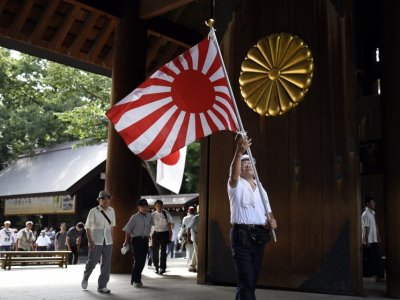-
Tips for becoming a good boxer - November 6, 2020
-
7 expert tips for making your hens night a memorable one - November 6, 2020
-
5 reasons to host your Christmas party on a cruise boat - November 6, 2020
-
What to do when you’re charged with a crime - November 6, 2020
-
Should you get one or multiple dogs? Here’s all you need to know - November 3, 2020
-
A Guide: How to Build Your Very Own Magic Mirror - February 14, 2019
-
Our Top Inspirational Baseball Stars - November 24, 2018
-
Five Tech Tools That Will Help You Turn Your Blog into a Business - November 24, 2018
-
How to Indulge on Vacation without Expanding Your Waist - November 9, 2018
-
5 Strategies for Businesses to Appeal to Today’s Increasingly Mobile-Crazed Customers - November 9, 2018
Horrors of World War II not forgotten: MFA
Japan is marking the anniversary with a series of memorial services and speeches, including one by Japanese Emperor Akihito, the son of wartime Emperor Hirohito.
Advertisement
“Japan should have given a clear account of the nature of the aggression war launched by Japanese militarists and its responsibility, offered honest apologies to people of countries that suffered in the war, and broken with the militarism past rather than glossing over history”, state news agency Xinhua quoted Foreign Ministry spokesperson Hua Chunying as saying.
“Japan has repeatedly expressed the feelings of deep remorse and heartfelt apology for its actions during the war”, Abe said.
On Friday, Abe issued a closely monitored statement, acknowledging damage and suffering on innocent people but falling short of apologizing in his own words to the victims of Japan’s aggression.
Visits to Yasikuni by top Japanese officials outrage China and South Korea because it honours 14 Japanese leaders convicted as war criminals by an Allied tribunal.
Singapore, the MFA said, had not forgotten the horrors and suffering of World War II.
Since Abe took office for the second time in 2012, Japan has eased its weapon export rules, increased military spending, weakened civilian control over the Self-Defense Forces, and pushed controversial security bills and amendments to its pacifist Constitution.
“I paid respects to the souls of those who sacrificed their precious lives in the past war”, Mr Abe’s aide Koichi Hagiuda said, adding he was visiting on behalf of Mr Abe in the premier’s role as head of the Liberal Democratic Party.
Japan invaded China and several Southeast Asian countries, but Abe among others has questioned whether that qualifies as “aggression”.
She lauded Abe’s statement as “very meaningful”, citing its emphasis on Japan’s postwar pursuit of pacifism and its declaration that future generations who have nothing to do with WWII shouldn’t be “predestined” to keep apologizing.
Analysts said Abe was appealing to allies and neighbours while sticking to his nationalist convictions.
The president said Abe’s much-anticipated statement on Friday had left “much to be desired” though she refrained from any specific critique.
In the statement, Abe also made an apparent reference to foreign wartime prostitutes for the Japanese army, though he avoided the question of whether the so-called comfort women were forced into the work, a hotly disputed issue with South Korea.
“(Those declarations) were foundations that have supported the South Korea-Japan relations”, she said.
“We must never forget that there were women behind the battlefields whose honor and dignity were severely injured”, he said.
Advertisement
His sentiments were repeated 10 years later by then-Prime Minister Junichiro Koizumi.





























